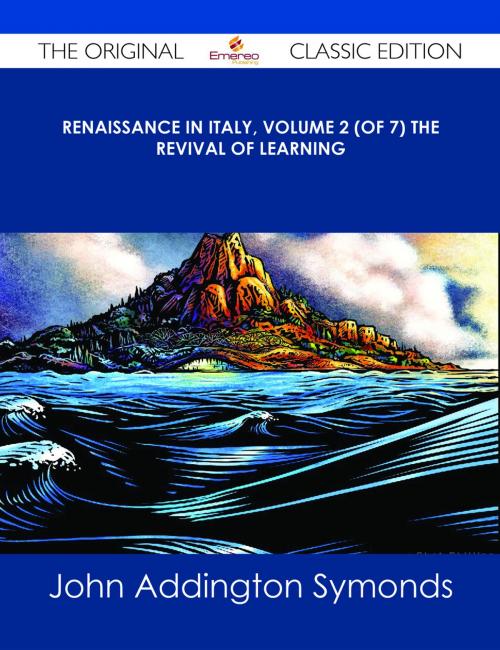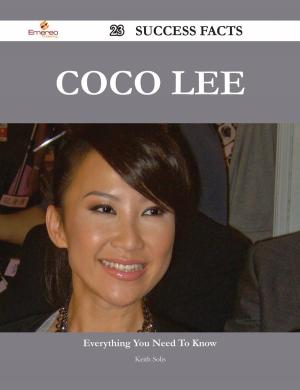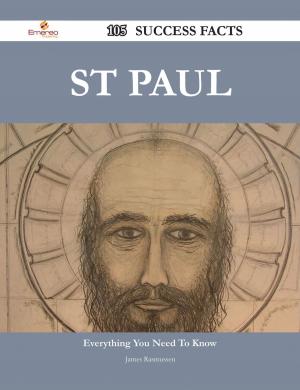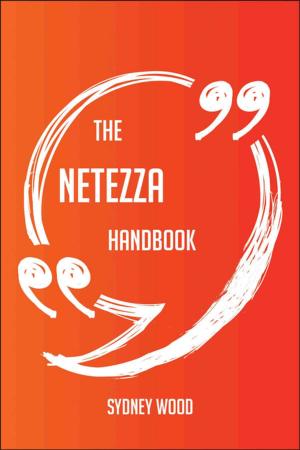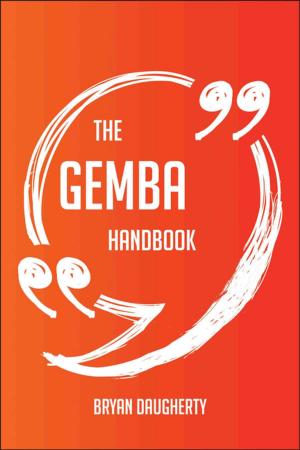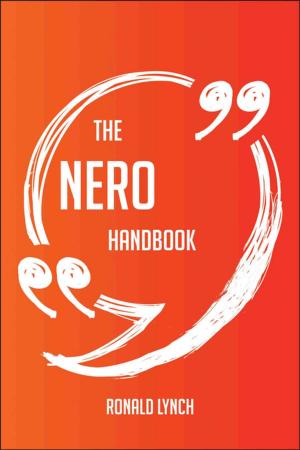Renaissance in Italy, Volume 2 (of 7) The Revival of Learning - The Original Classic Edition
Nonfiction, Reference & Language, Reference, Fiction & Literature| Author: | John Addington Symonds | ISBN: | 9781486492978 |
| Publisher: | Emereo Publishing | Publication: | March 10, 2013 |
| Imprint: | Emereo Publishing | Language: | English |
| Author: | John Addington Symonds |
| ISBN: | 9781486492978 |
| Publisher: | Emereo Publishing |
| Publication: | March 10, 2013 |
| Imprint: | Emereo Publishing |
| Language: | English |
This is a new and freshly published edition of this culturally important work by John Addington Symonds, which is now, at last, again available to you.
Get the PDF and EPUB NOW as well. Included in your purchase you have Renaissance in Italy, Volume 2 (of 7) The Revival of Learning in EPUB AND PDF format to read on any tablet, eReader, desktop, laptop or smartphone simultaneous - Get it NOW.
Enjoy this classic work today. These selected paragraphs distill the contents and give you a quick look inside Renaissance in Italy, Volume 2 (of 7) The Revival of Learning:
Look inside the book:
Formation of Conscious Personality in Italy—Aristocracy of Intellect—Self-culture as an Aim—Want of National Architecture—Want of National Drama—Eminence of Sculpture and Painting—Peculiar Capacity for Literature—Scholarship—Men of Many-sided Genius—Their Relation to the Age—Conflict between Mediæval Tradition and Humanism—Petrarch—The Meaning of the Revival begun by him—Cosmopolitan Philosophy—Toleration—An Intellectual Empire—Worldliness—Confusion of Impulses and Inspirations—Copernicus and Columbus—Christianity and the Classics—Italian Incapacity for Religious Reformation—Free Thought takes the form of License—Harmonies attempted between Christianity and Antique Philosophy—Florentine Academy—Physical Qualities of the Italians—Portraits of Two Periods—Physical Exercises—Determination of the Race to Scholarship—Ancient Memories of Rome—The Cult of Antiquity—Desire of Fame—Fame to be found in Literature—The Cult of Intellect—The Cult of Character—Preoccupation with Personal Details—Biography—Ideal Sketches—Posthumous Glory—Enthusiasm for Erudition—Piero de' Pazzi—Florence and Athens—Paganism—Real Value of Italian Humanism—Pico on the Dignity of Man 1 ...Formation of Conscious Personality in Italy—Aristocracy of Intellect—Self-culture as an Aim—Want of National Architecture—Want of National Drama—Eminence of Sculpture and Painting—Peculiar Capacity for Literature—Scholarship—Men of Many-sided Genius—Their Relation to the Age—Conflict between Mediæval Tradition and Humanism—Petrarch—The Meaning of the Revival begun by him—Cosmopolitan Philosophy—Toleration—An Intellectual Empire—Worldliness—Confusion of Impulses and Inspirations—Copernicus and Columbus—Christianity and the Classics—Italian Incapacity for Religious Reformation—Free Thought takes the form of License—Harmonies attempted between Christianity and Antique Philosophy—Florentine Academy—Physical Qualities of the Italians—Portraits of Two Periods—Physical Exercises—Determination of the Race to Scholarship—Ancient Memories of Rome—The Cult of Antiquity—Desire of Fame—Fame to be found in Literature—The Cult of Intellect—The Cult of Character—Preoccupation with Personal Details—Biography—Ideal Sketches—Posthumous Glory—Enthusiasm for Erudition—Piero de' Pazzi—Florence and Athens—Paganism—Real Value of Italian Humanism—Pico on the Dignity of Man.
About John Addington Symonds, the Author:
10 Aware of the taboo nature of his subject matter, Symonds referred obliquely to pederasty as 'that unmentionable custom' in a letter to a prospective reader of the book, but defined 'Greek love' in the essay itself as 'a passionate and enthusiastic attachment subsisting between man and youth, recognised by society and protected by opinion, which, though it was not free from sensuality, did not degenerate into mere licentiousness.' ...Symonds also translated classical poetry on homoerotic themes, and wrote poems drawing on ancient Greek imagery and language such as Eudiades, which has been called 'the most famous of his homoerotic poems': 'The metaphors are Greek, the tone Arcadian and the emotions a bit sentimental for present-day readers.'
This is a new and freshly published edition of this culturally important work by John Addington Symonds, which is now, at last, again available to you.
Get the PDF and EPUB NOW as well. Included in your purchase you have Renaissance in Italy, Volume 2 (of 7) The Revival of Learning in EPUB AND PDF format to read on any tablet, eReader, desktop, laptop or smartphone simultaneous - Get it NOW.
Enjoy this classic work today. These selected paragraphs distill the contents and give you a quick look inside Renaissance in Italy, Volume 2 (of 7) The Revival of Learning:
Look inside the book:
Formation of Conscious Personality in Italy—Aristocracy of Intellect—Self-culture as an Aim—Want of National Architecture—Want of National Drama—Eminence of Sculpture and Painting—Peculiar Capacity for Literature—Scholarship—Men of Many-sided Genius—Their Relation to the Age—Conflict between Mediæval Tradition and Humanism—Petrarch—The Meaning of the Revival begun by him—Cosmopolitan Philosophy—Toleration—An Intellectual Empire—Worldliness—Confusion of Impulses and Inspirations—Copernicus and Columbus—Christianity and the Classics—Italian Incapacity for Religious Reformation—Free Thought takes the form of License—Harmonies attempted between Christianity and Antique Philosophy—Florentine Academy—Physical Qualities of the Italians—Portraits of Two Periods—Physical Exercises—Determination of the Race to Scholarship—Ancient Memories of Rome—The Cult of Antiquity—Desire of Fame—Fame to be found in Literature—The Cult of Intellect—The Cult of Character—Preoccupation with Personal Details—Biography—Ideal Sketches—Posthumous Glory—Enthusiasm for Erudition—Piero de' Pazzi—Florence and Athens—Paganism—Real Value of Italian Humanism—Pico on the Dignity of Man 1 ...Formation of Conscious Personality in Italy—Aristocracy of Intellect—Self-culture as an Aim—Want of National Architecture—Want of National Drama—Eminence of Sculpture and Painting—Peculiar Capacity for Literature—Scholarship—Men of Many-sided Genius—Their Relation to the Age—Conflict between Mediæval Tradition and Humanism—Petrarch—The Meaning of the Revival begun by him—Cosmopolitan Philosophy—Toleration—An Intellectual Empire—Worldliness—Confusion of Impulses and Inspirations—Copernicus and Columbus—Christianity and the Classics—Italian Incapacity for Religious Reformation—Free Thought takes the form of License—Harmonies attempted between Christianity and Antique Philosophy—Florentine Academy—Physical Qualities of the Italians—Portraits of Two Periods—Physical Exercises—Determination of the Race to Scholarship—Ancient Memories of Rome—The Cult of Antiquity—Desire of Fame—Fame to be found in Literature—The Cult of Intellect—The Cult of Character—Preoccupation with Personal Details—Biography—Ideal Sketches—Posthumous Glory—Enthusiasm for Erudition—Piero de' Pazzi—Florence and Athens—Paganism—Real Value of Italian Humanism—Pico on the Dignity of Man.
About John Addington Symonds, the Author:
10 Aware of the taboo nature of his subject matter, Symonds referred obliquely to pederasty as 'that unmentionable custom' in a letter to a prospective reader of the book, but defined 'Greek love' in the essay itself as 'a passionate and enthusiastic attachment subsisting between man and youth, recognised by society and protected by opinion, which, though it was not free from sensuality, did not degenerate into mere licentiousness.' ...Symonds also translated classical poetry on homoerotic themes, and wrote poems drawing on ancient Greek imagery and language such as Eudiades, which has been called 'the most famous of his homoerotic poems': 'The metaphors are Greek, the tone Arcadian and the emotions a bit sentimental for present-day readers.'
